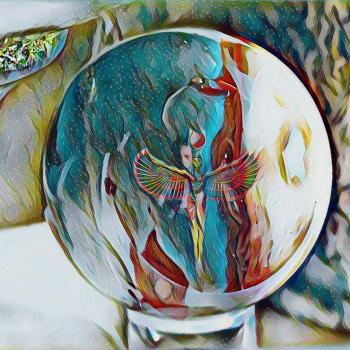True Names have power.
This isn’t a new idea – it’s a concept that’s interwoven with human civilization pretty much as far back as known history. Yet, the idea that names have power is really an emergent property of something more fundamental.
What is the essence of a thing?
 All cats are called Cat. My specific cats are called Bitta, Kobe and Pi. My cats are all domestic cats. I know that some big cats are called Lion, but I don’t know the name of any specific big cat. I can call one of my cats by name, and it might, if I’m lucky, come to me. If I fill the food bowl, all of the cats capable of reaching the bowl will show up in short order.
All cats are called Cat. My specific cats are called Bitta, Kobe and Pi. My cats are all domestic cats. I know that some big cats are called Lion, but I don’t know the name of any specific big cat. I can call one of my cats by name, and it might, if I’m lucky, come to me. If I fill the food bowl, all of the cats capable of reaching the bowl will show up in short order.
If I know the name of a class of object, that name gives me the language to be able to talk about that kind of thing. I can say that lions are very big, and that they occasionally like to sit in cardboard boxes. I know that because I saw it on the internet. I know that domestic cats like to sit in cardboard boxes too. I know that because my cats insist on sitting in every cardboard box they can get their paws on, and this appears to be a consensus amongst cat owners. I read that on the internet too.
Some of the Neoplatonist philosophers, both Pagan and Christian, suggested that whilst archetypes do not exist in the material world, they do exist within the mind of God. Kabbalah is at least in part the systematization of exactly this concept.
As a mere mortal, though I can use the word Cat in conversation, I do not have the power to summon the elemental forces to use the Word of Cat to directly bring forth a kitten from the formless void. Generally I’d instead recommend adopting from a cat shelter – it’s easier, and you’re less likely to set the curtains on fire.
But, if I have the name of a specific cat, this gives me power. Not much, but some. I can say, “Hey, Gina, Bitta wants some water, can you please fill her bowl?” In this case, I used the Name of my wife and the Name of our grouchy old cat in order to avoid the need to do the chore myself.
This way of thinking – the idea that names have power – fell out of favor as science and engineering dominated society from the industrial revolution onwards. However, computerization and the subsequent rise of the Internet as the primary means of connecting people in our modern world has flipped this entirely.
Our names really do have power. Power over us.
It is hard to be a face in the crowd in 2014. When most of our communications are digital, most of what we hear, say, type or even think is indelibly attached to us, potentially forever. If I write something stupid in a blog post, this piece of information will always stick to me. If I click on an advert, it will always be known that I have a thing for air tools, particularly nail guns. Similarly, if I do something useful or positive, this potentially also forms part of my outward identity. My True Identity, then, is the collective bundle of all the things that I have been seen to do. Though the humans that I know tend to call me by one of a small number of human names, my much more nebulous digital identity is what I’m known as to the subsentient limited artificial intelligences that already pervade the internet, serving precisely tailored click bait. Such systems don’t much care what I call myself – all they want to do is sell me something.
I wish this last bit was actually true.
It was possibly true a handful of years ago. Right now, though it sounds dystopian, it’s already wishful thinking for a better past. We have already hit a point where these unseen systems have gone way past a point of generating a better class of spam. They want to own us. They want to use our True Names to track us, to hold court over us. But, these systems don’t want anything. They are subsentient. They can’t be reasoned with, can’t be persuaded. Yet they are intelligent, just not intelligent in the same way as you or I.
Facebook has maintained its dubious real names policy despite many attempts to persuade it otherwise. A few weeks ago, someone, possibly an individual acting alone, took it on themselves to report hundreds of people to Facebook as having fake names. This caused a large number of people, many of whom were transgendered, some of whom were drag queens, to have their accounts suspended. Unfortunately for Facebook, their HQ is pretty much in the back yard of the Sisters of Perpetual Indulgence, who didn’t take this well. There were in-person meatspace protests. Facebook publicly apologized. Yet, a week after the so-called apology, it seems that Facebook are still suspending accounts under their real names policy.
Why should you care?
If you conduct all your online life using your birth name, it might not be apparent why you should care about this. I might just be a tinfoil-hatted saucerhead from California who makes a hobby of getting annoyed at things, after all. If you don’t use your birth name, for example because you’re transgendered, because you’d prefer to use a religious name, avoiding a stalker, have a need to keep your internet presence distinct from your work or home life, or any of a myriad other reasons, you care already so I don’t really need to explain it. For the first group who are still wondering about my ever-so-shiny headgear, just try imagining yourself in the position of a member of the second group, and ask yourself if you’d really wish that on them. That’s the social justice answer, and frankly it should be enough right there.
However, there is another reason. This time, you need to ask yourself why Facebook cares enough to put up with the PR disaster area that this has been causing them since at least 2009. Facebook already has access to your digital identity, to a scary degree of precision. It can sell you stuff just fine with that and nothing else. But, these digital identities lack a well-defined unique key. A unique key, in database theory, is kind-of the computer science equivalent of the True Name a sorcerer might use to call up a goetic daemon. The unique key par excellence for humans would be their Social Security Number, National Insurance Number or whatever your local equivalent happens to be called. Guaranteed unique, but more importantly, guaranteed to track you cradle to grave, whether you like it or not. Your full birth name isn’t quite as good, but it’s close, and with a few other bits of information like the school you went to, your current and previous location will do just fine. Had you noticed that Facebook makes it ever so easy to hand this information over?
Why?
Simply, if they can uniquely identify you, they can sell your information for more money. It’s just the ugly underbelly of capitalism at work. However, there are other organizations out there using exactly these techniques, and most likely Facebook’s actual data, to track your location and your interests.
The other piece of information that Facebook wants is really Facebook’s crown jewel: your social graph. If you have everyone’s social graph, related back to their unique key, you have the most powerful tool that the enforcement of law and order could ever wish for. Unfortunately, this is also the worst imaginable temptation for anyone willing to put their own power first over the integrity of the little people who represent the nodes on the graph. Due process is expensive. Collecting evidence by conventional means is frustrating, when there is a great Oracle (pun intended) that when petitioned appropriately can enact Trial by Database Query. So simple, so efficient.
Yes, I’m sure some of you can see the tinfoil sparkling. But what is the TSA No Fly List if it is not Trial by Database Query? One might argue that being denied travel doesn’t really harm anyone (much), and the safety and security of the nation is so much more important. No one would use this kind of thing for something bigger, like, say in a criminal case? Actually, the NSA has been shown to have been doing exactly this for years, passing information gleaned by covert wiretaps to law enforcement agencies who have been encouraged to fake equivalent evidence in order to avoid the need to divulge the source of their information.
I’ll remind you again: True Names have power.
Queer of Swords is published on alternate Thursdays. Subscribe via RSS or e-mail!













